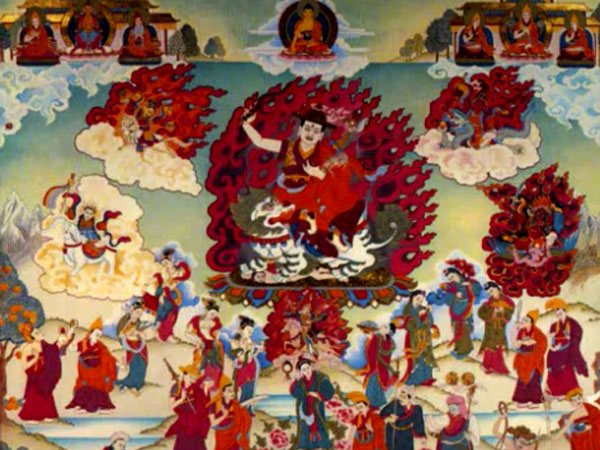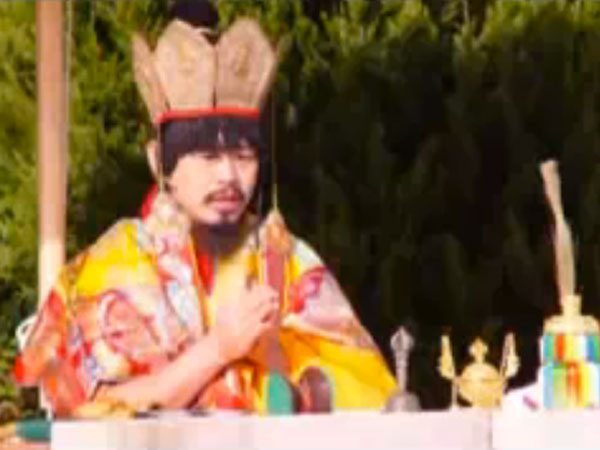DHARMA READINGS
| OFFERINGS | | Print | |
Page 1 of 3 By Panchen Otrul Rinpoche  Offerings are the formal religious expression of the fundamental Buddhist virtue of giving. The perfection of giving, dana-paramita in Sanskrit, is the first of the six or ten perfections. It encompasses every kind of generosity, whether it involves a gift to those higher than ourselves, such as deities in the merit field, or the poor or needy, who are worse off than we are. In giving to a being in an equal or worse state than ourselves, we sacrifice something that belongs to us for the benefit of another. In giving to a being superior to ourselves, to our Guru, a Buddha or Bodhisattva, we perform an act of renunciation. Readers' Comments
As an altruistic deed, giving is a basis for acquiring merit. In Buddhist doctrine, the accumulation of merit leads to higher rebirth, and eventually to release from the sufferings of cyclic existence. In order to attain highest enlightenment, we must be able to give to a superlative degree, with perfect motivation, thus attaining the unsurpassable level of the perfection of giving. Whether the physical offerings benefit the recipient or not, from a Buddhist practitioners point of view as a donor, they are essential means of reducing our attachment to the physical world. Attachment reinforces our notion of ourselves as real, independent selves to be satisfied by obtaining or clinging onto objects we desire. Making offerings accustoms the mind to giving and letting go of desirable objects. It serves to loosen our conception of a real and independent self. In this way, it contributes to our acquiring the essential wisdom realizing that all phenomena as empty of intrinsic existence. Without such realization we will not attain Buddhahood. The value of merit acquired from an act of giving depends on several factors: the motivation, the status of the recipient and the quality of the offering.
Motivation You may offer a bag of gold to a monastery, but if your real intention is just to show off, to acquire further wealth or a similar worldly motivation, the merit acquired may provide the desired result, but no more. If you give with a wish to attain liberation from cyclic existence, much greater merit will be generated. And, if by giving, you aspire to the ultimate attainment of Buddhahood for the benefit of all sentient beings, the merit you acquire will be limitless. During the Buddhas lifetime, when he was staying in Shravasti, King Prasenajit celebrated his presence with a lavish banquet presented before all the important people in the town. One poor man looking on from the edge of the crowd rejoiced at this display of generosity. Later, when Ananda asked the Buddha who had created the greatest merit as a result of the feast, he replied that it was the poor man who rejoiced at the kings virtue. The story is also told of a woman who lived the life of a beggar at the time of a previous Buddha. She and her husband owned nothing but the single piece of cloth which they would take turns to wrap around themselves when they went to beg for food. The Buddha of that time was nearby and a monk on his alms round came across the woman and exhorted her to take advantage of the opportunity to go and make offerings to the Awakened One. Realizing that she and her husband were beggars because they had neglected to give in the past, she decided to offer their only possession to the Buddha. Her husband simply asked how they would live if they were unable to beg, because she had given away their only clothing. She replied, If we give the cloth and then die, what will be the loss? We have nothing in this life, but we will have good fruits in the next. If we make such a gift and then die we shall be fortunate. So saying, she asked the monk to look away while she wrapped herself in grass and handed him the cloth as an offering to the Buddha. The monk accepted the offering with embarrassment. However, before the king and queen, the wealthy merchants and countless onlookers, the Buddha picked out the heap of rags and hailed it as the most worthy offering, because the woman's motivation was pure. The woman later attained liberation at the time of the Buddha Shakyamuni, who cited her story as an example to others to give gifts. Another example of the importance of pure motivation is shown in the story of Geshe Ben. He was a celebrated Tibetan lama who, following a career as a notorious bandit, became a great practitioner. One day, hearing that his patron was coming to visit, he worked from early morning dusting his altar and arranging his offerings in an attractive manner. Sitting back to admire his work, and pleased at the thought of how impressed his patron would be, he suddenly realized the impure nature of his motivation. He picked up a handful of ashes and threw them over the offerings to destroy his pride. Later, other Kadampa masters commented that such offerings were by far the most valuable because they were made with a pure motivation, without hope of reward. The actual aim in making elaborate offerings is to give up our preoccupation with external objects and to place spiritual aims above material pleasures. However, the motivation can become distorted. We may give with the hope of a greater return, leading only to disappointment. Pure offerings should be made with faith and without regret. When Atisha, the Indian saint, visited Tibet in the 11th century, he greatly praised the quality of the water. He recommended using it to make offerings because although it had numerous qualities, nobody would regret giving water away. The word for offering in Sanskrit is puja, which means to please. In making offerings to exalted beings such as Buddhas, Bodhisattvas and various deities, we not only accumulate merit, but also create connections with these higher beings. If we make such offerings with a pure motivation, they will help us on the path to enlightenment. Although exalted beings have no real need for our offerings, they delight in the merit of the giver, which is determined by the quality of his or her motivation. It may be possible to fool other people, pretending to be acting out of a pure and exalted motivation, covering up your mundane aspirations, but it does not generate merit. Apparently, attractive offerings performed with an ulterior motivation do not please the Buddhas and bodhisattvas and generate little merit. The situation is comparable to the relationship between a good master and a deceitful servant. However much the servant may flatter his master, he will only be really pleased if his servant performs his duty faithfully and genuinely tries to be helpful. Similarly, an offering made to the Buddhas with perfect motivation will generate merit of the same nature as that generated by the Buddhas of the past, present and future. It will merge with that inexhaustible pool of merit, giving rise to boundless merit. This is what is known as pleasing the Buddhas. It is the ultimate purpose of making offerings.
The recipient Making offerings to wise beings such as Buddhas, Bodhisattvas and Spiritual Masters is an occasion for faith and joy. When giving to those who help us, such as our parents or friends, we should give impartially, with equanimity, the basis for developing the awakening mind. Giving is not an opportunity to favor one being over another, for all beings are equal in wishing to be happy. Giving simply to show off and cultivate popularity or to outdo someone else will result in little merit. To give purely, we should do so joyfully without regret, with equanimity and without expectation of any reward.
Action
The object The greater the sacrifice we make, the greater the merit we create. A piece of gold offered by a poor man for whom it represents his entire wealth will earn more merit than when a rich man offers it among many other such pieces. The ultimate sacrifice is to give away parts of our bodies. Many instances of such offerings are recounted in the collection of stories about the Buddhas past lives. The Buddha spent many aeons accumulating limitless merit through the practice of the six perfections of giving, ethics, patience, effort, meditative stabilization and wisdom. For example, in one of his past lives, the future Buddha was Santavik, the son of a merchant. One day he noticed that the birds in the nearby cemetery were starving, and overwhelmed by compassion for them, decide to offer them his body. He lay down as if dead and soon vultures began pecking at his left eye. They were intrigued that he kept so still and paused. Santavik thought, This body is impermanent, I have no desire for it, and giving it away is beneficial. He encouraged the birds to eat it, and they did so without misgivings. As this story shows, perfect giving is accomplished without regret. Giving away part of your body requires a degree of determination that reflects a high level of realization. Beginners cannot readily perform such acts, and if they try to do so are likely to lead to disaster. Even practitioners who have attained sufficient spiritual realization will not give away their bodies for a trivial purpose or to someone demanding it out of malice. It is likewise a mistake to give something to someone who we know will use it to harm others.
Dedication Similarly, when correctly dedicating our merit, like casting it into the ocean of merit created by Buddhas and Bodhisattvas, being of a similar nature, it will likewise be inexhaustible. If, on the other hand, we dedicate our merit to some worldly end, it is like throwing a stone into the ocean. Being of a different nature from that of the Buddhas, our merit will not become one with theirs, but will remain like a small pebble lying on the ocean floor.
Obstacles to giving Although we should not dwell on what we might receive in return when we give something ourselves, it can be encouraging to remind ourselves and others of the positive effects of giving. That generosity is the principal cause of wealth in future lives, for example, can function as an attractive incentive for someone otherwise not inclined to give. Acquiring resources through giving can also be justified by the need for at least basic material facilities, if we are to achieve the ultimate goal of perfect Buddhahood for the welfare of all sentient beings. If we are not very determined in our practice of generosity, we should enumerate all the positive reasons for giving. Recall that all beings, just like us, wish for happiness and seek to avoid suffering. Altruistic actions on our part can quell another's pain or contribute to his or her well-being. Giving to others or helping them in other ways also reduces our emphasis on our own interests and serves to diminish attachment. Recognizing that recipients are pleased with his or her offerings, a giver should feel encouraged. These ways of thinking can be helpful to people who have trouble parting with their wealth or possessions. Avaricious people who wish to overcome their attachment can begin gradually, to accustom their minds to giving. First, they can give away small things. At the time of the Buddha, there was a wealthy merchant known for his miserliness. One day, he came to see the Buddha and told him that however hard he tried, he could not bear the thought of even giving water to someone begging at his door. The Buddha advised him to take some grain in his hand and pass it from one hand to the other and to think that one hand was giving to the other. This is how he began to accustom himself to the simple notion of giving.
|
OTHER DHARMA READINGS
- A GUIDE TO SPIRITUAL PRACTICE
- DHARMA DEMYSTIFIED: NAGARJUNA, THE FOUNDER OF THE MAHAYANA TRADITION
- DORJE SHUGDEN ON BLACK HORSE
- WHY MANJUSHRI MATTERS
- DHARMA DEMYSTIFIED: THE ENTHRONEMENT OF DORJE SHUGDEN









